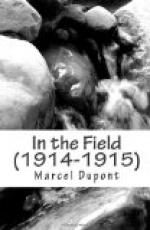Ought we to lament or to envy the touching and simple burial rite of soldiers? To me, nothing could be more beautiful than such a last resting-place. Why should we desire richer tombs, sepulchral stones, and sculptured monuments? We are all equal upon that field of death, the battlefield at the close of day. And there can be no fitter shroud for him who has fallen on that field than his soldier’s cloak. A little earth that will be grass-grown and flower-spangled again in the spring, a simple cross of rough wood, a name, a regimental number, a date—all this is better than the most splendid obsequies. And what can be more touching than the poor little bunches of wild flowers which the friends of the dead gather on the banks of ditches, and which are to be seen days afterwards, faded and yet so fair, hanging on the humble crosses? Such was to be the portion of Lagaraldi and Durand. Why should we pity them? We will weep for them, we will not pity them.
They were there, lying side by side in their cloaks, the turned-up capes of which shrouded their heads, and we bared our own in silence. Each of us, consciously or unconsciously, breathed a prayer, each set his teeth and tried to restrain his tears.
But we were not destined to pray in peace to the end. At the moment when the Lieutenant-Colonel was about to express our sorrow and pronounce the last farewell the enemy’s mortars, suddenly changing their objective, began to bombard the part of the wood on the edge of which we were standing.
What was their idea? Did they think our reserves were massed in the wood? However this may have been, a formidable avalanche descended above and around us. The first salvo literally cleared the wood close by us. A great tree, cut through the middle, bent over for an instant and then rolled gently to the ground with a great crackling of broken boughs. At the same time the German bullets began to whistle round us by thousands, apparently determined to draw us into their frenzied saraband. Death seemed for a moment inevitable. We could not hesitate; we had to take cover, or to be mown down by shot or shell.
Then—I shall remember the gruesome moment to my dying hour—we all leaped into the only available shelter—crouching together in the newly-dug graves. We were just in time.
Bullets flew past us; the great “coal-boxes” burst without intermission. The uproar was tremendous, beyond anything we had ever heard. It would be impossible to describe the horror of those minutes. Those graves, all too spacious for the poor bodies we were about to commit to them, were too small to shelter us. We pressed one against the other in the strangest positions, hiding our heads between the shoulders of those who were lying in front of us; we thought every moment that the network of projectiles would be drawn more tightly round us, and that one would fall into our holes, transforming them into a ghastly charnel-house.




